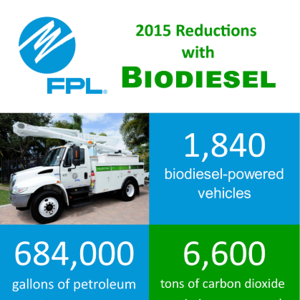Profile: FPL achieves key emissions reductions with biodiesel

Image: The National Biodiesel Board
May 12, 2016
BY The National Biodiesel Board
“Powered by Biodiesel” decals adorn Florida Power & Light Co.’s diesel vehicles as they traverse Florida and beyond. The signage highlights the key role this advanced biofuel is playing in the company’s sustainability strategy.
“FPL operates one of the largest green fleets in the country, with approximately 1,840 biodiesel-powered vehicles and 570 electric and hybrid electric vehicles—allowing us to reduce emissions and pass on fuel savings to our customers,” said Patti Earley, FPL fleet fueling operations specialist and the newest member of the Biodiesel Ambassadors program supported by the National Biodiesel Board. The Biodiesel Ambassadors are part of a partnership program supported by the NBB. The Ambassadors are volunteers who support biodiesel, and use their biodiesel expertise to raise the level of understanding in their communities and nationally. “In 2015 alone, our fleet saved 684,000 gallons of petroleum fuel and prevented more than 6,600 tons of carbon dioxide emissions,” Earley said.
FPL’s journey to revolutionize its fleet started in 2006 when it became the first energy company to place into service a medium-duty hybrid-electric bucket truck. Today the company’s fleet includes both electric and hybrid trucks that use up to 60 percent less fuel and reduce exhaust emissions up to 90 percent.
“At FPL, we pride ourselves on being good stewards of the environment and have developed a comprehensive sustainability strategy,” she said. “Biodiesel is the perfect fit because it’s renewable, sustainable and cleaner burning—there is no downside.”
Advertisement
Earley explained that FPL vehicles need reliable fuel because they are constantly put to the test by working in extremely challenging environments. FPL crews drive the trucks all over the Sunshine State, on-road and off-road, often traveling up to 300 miles a day in extreme heat. They also plow through swampy terrain in the Florida Everglades or bull across inaccessible roads to restore power.
“Our 1,840 biodiesel vehicles have accumulated more than 100 million miles using B20 without encountering any biodiesel-related issues,” said Earley. FPL’s vehicle evaluations have demonstrated no appreciable change in fuel economy, engine wear or driver acceptance with biodiesel.
FPL purchases more than 500,000 gallons of B100 annually. While the company primarily powers its fleet with B20, it’s also used blends of up to B35. “Because biodiesel is a drop-in fuel, there is no infrastructure issues involved, making it very easy to use,” Earley added.
When Superstorm Sandy devastated much of the East Coast in 2012, FPL crews headed north to help restore power. With fuel in short supply, FPL crews took transport trailers full of B20 on the road with them. They not only fueled their own vehicles with B20, but pumped it into a variety other utility vehicles that needed fuel.
Advertisement
“No one really knew the difference,” said Earley. “But we knew that we had fuel we could count on that also happens to be better for the environment.”
FPL provides energy to more than 4.8 million customers in Florida, with its fleet of 3,800 vehicles covering 27,000 square miles of service territory. In 1999, the company began experimenting with B20 in diesel vehicles in two locations. Since then, the biodiesel program has achieved much success, surpassing expectations.
In 2010, Ford Motor Co. asked FPL to participate in an unprecedented “extreme-duty” B20 testing program with 2011 Ford F-Series Super Duty diesels. Positive results help spur the decision to make all 2011 Ford F-Series Super Duty diesel pickups fully compatible with B20.
In 2008, FPL earned the NBB’s annual Eye on Biodiesel Award for its leadership as a biodiesel champion. FPL fields about a dozen calls a month from others interested in transitioning to biodiesel, and educates them about use of the fuel.
Related Stories
Keolis Commuter Services, the Massachusetts Bay Transportation Authority’s operations and maintenance partner for the Commuter Rail, has launched an alternative fuel pilot utilizing renewable diesel for some locomotives.
Luxury North Dakota FBO, Overland Aviation—together with leading independent fuel supplier, Avfuel Corp.— on May 19 announced it accepted a 8,000-gallon delivery of sustainable aviation fuel (SAF) on May 12.
Neste and FedEx, the world’s largest express cargo airline, have agreed on the supply of 8,800 metric tons (more than 3 million gallons) of blended Neste MY Sustainable Aviation Fuel to FedEx at Los Angeles International Airport (LAX).
Wheels Up Experience Inc. on May 6 announced the launch of its new SAF program, under which Wheels Up will partner with Delta Air Lines to purchase SAF, allowing private fliers to participate regardless of their flight operator or departure airport.
Germany-based Mabanaft on April 17 announced it started to supply SAF to airlines at Frankfurt Airport in January. The company said it will deliver more than 1,000 metric tons of SAF to the airport this year under the European SAF mandate.
Upcoming Events










